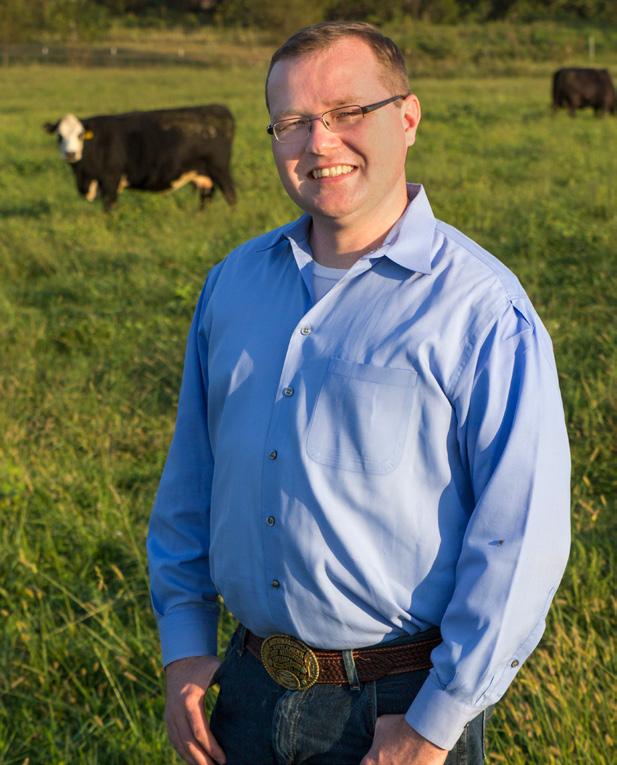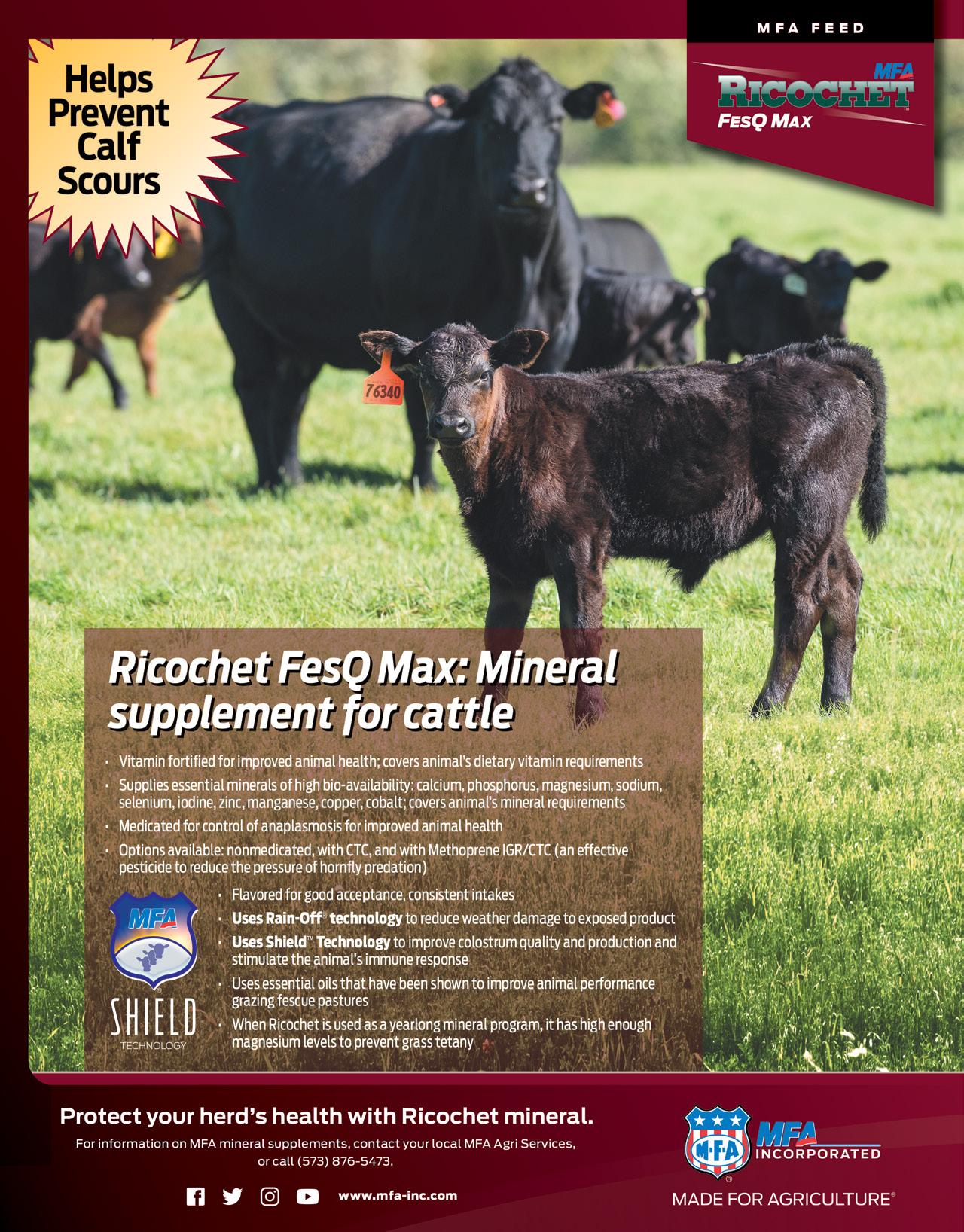
7 minute read
Straight Talk: Mike Deering
Straight Talk with Mike Deering
Smoke & Mirrors
Too often, the political process is an exercise in smoke and mirrors. I believe it is our responsibility to ensure you know who is fighting for you and who is blowing smoke.
Your top priority in the state legislature was modifying eminent domain laws. Eminent domain was always intended to be used as a last resort to provide critical infrastructure to the general public. It was never intended to be used by for-profit companies to take private land for private gain. That’s exactly what is happening in the case of Chicago-based Invenergy’s socalled Grain Belt Express. It is bigger than one project. It is the dangerous precedent this project sets. It’s the domino effect.
The House quickly passed the legislation sponsored by Rep. Jim Hansen. In fact, it was the first bill passed this year. We appreciate all House members who supported it. The speed of this bill traces back to the top. Speaker of the House Elijah Haahr is a defender of private property rights who saw the blatant injustice occurring to landowners now and the threat moving forward. He made this issue his issue and he didn’t have to do that. We are also beyond grateful for the passion of Rep. Hansen.
The companion legislation, sponsored by Sen. Justin Brown, passed out of committee on January 29. It was apparent the Senate was going to be a hurdle. We were anxious to once again prove naysayers wrong. Then COVID-19 happened. Once the legislature reopened, everyone was scrambling to save their top priority. Our chance came on May 6. This is where we got to see who stood with us, who worked against us and who chose to
Executive Vice President
remain silent. We got to see the exercise in smoke and mirrors.
The only senators on that floor who truly fought for us were Sens. Justin Brown and Mike Bernskoetter. Many chose to remain silent on the issue even when they had the opportunity to speak. Every democrat except for two vocally participated in the filibuster led by Sen. Scott Sifton. He filibusters almost every bill we support, and we are truly excited to see him leave as he terms out this year. The real filibuster surprise came from a leader of the so-called conservative caucus, Sen. Bill Eigel. Hypocrisy was on full display, and he was a disappointment to anyone who believes property rights are at the core of who we are as a nation. Sen. Ed Emery and Sen. Bill White also spoke against the bill, but they have at least been consistent on this issue from the beginning.
Our policy committee will review elections and present recommendations to the Board of Directors, who must approve endorsements by an 80% majority. We will continue to fight for you. We will support those who support you. You deserve more than smoke and mirrors. Please make plans to attend the Cattlemen’s Steak Fry on July 11 to ensure we have the funds to make a difference.

President Donald Trump Addresses Beef Imports During NCBA White House Visit
Source: NCBA
DENVER (May 19, 2020) – National Cattlemen’s Beef Association (NCBA) CEO Colin Woodall issued the following statement in response to comments made by President Donald Trump’s about beef imports:
“Today’s comment by President Donald Trump demonstrates the complexity of the U.S. beef business. Live cattle imports to the United States only come from Canada and Mexico and will continue to do so under the terms of the President’s newly negotiated USMCA. America has not imported live cattle from other nations for several years. However, if President Trump is serious about reconsidering import decisions, NCBA and its members strongly request the White House to take another look at his decision to allow fresh beef imports from nations like Brazil, where there continue to be concerns with foot-and-mouth disease and USDA’s decision to reopen the American market to Brazilian beef. Source: NCBA WASHINGTON (May 19, 2020) — National Cattlemen’s Beef Association (NCBA) President Marty Smith today joined President Donald Trump and U.S. Secretary of Agriculture Sonny Perdue at a White House ceremony to unveil new details about the Coronavirus Food Assistance Program (CFAP). NCBA was instrumental in securing authorization and funding for the CFAP program, which will provide much-needed relief to American cattle producers who have been economically impacted by the coronavirus pandemic. “America’s cattle producers have been hit very hard economically by this pandemic, so we’re pleased that this relief is one step closer to reaching the producers who need it,” Smith said. “Still, this is just one step and much more needs to be done to address the needs facing family cow-calf producers and stockers in the CFAP details that were released today. We will continue to “Beef trade is a complex business, and America’s cattle producers rely on safe and reliable international trading partners, both as a destination for the undervalued cuts we produce here, such as hearts, tongues, and livers, and for importation of lean trim for ground beef production to meet strong consumer demand. Approximately 12 percent of beef consumed in the U.S. is imported product, but that product must meet the U.S. standards for safety before it is allowed into our market.
“President Trump has shown his willingness to negotiate difficult trade deals and take on tough trading partners, and NCBA thanks him for the attention he has given to beef. We encourage him to re-examine the decision to reopen the market to imports from Brazil, Namibia, and any other nation where there are food safety or animal health concerns that could impact American consumers or cattle producers. A re-evaluation of those imports can accomplish his goals of protecting both American cattle producers and American consumer confidence in our
New CFAP Details “One More Step, But Much More Needs to Be Done to Help FamilyOwned Cow-Calf and Stocker Operations”
own beef supply chain.” push Capitol Hill for additional resources for cow-calf producers, backgrounders, and all other segments of the industry who may not sufficiently benefit from the program in its current form.”
President Trump announced that beginning on Tuesday, May 26, local Farm Service Agency offices will begin accepting applications for CFAP funds, which the Administration hopes to begin rolling out to producers the following week. More information about the application process will be available at https://www. farmers.gov/cfap/livestock.
USDA announced the CFAP program on April 17. The program will use funding provided in the Coronavirus Aid, Relief, and Economic Security (CARES) Act, the Families First Coronavirus Response Act, and other USDA authorities. $19 billion in immediate relief includes direct support to agricultural producers.
Dr. Stephen R. Koontz Sends Letter On How Marketing Mandates May Negatively Impact Cattle Industry
Source: NCBA
WASHINGTON (May 4, 2020) - National Cattlemen’s Beef Association (NCBA) President-Elect Jerry Bohn, today released the following statement in response to a letter from Dr. Stephen R. Koontz of Colorado State University providing additional context and clarity regarding his work on cattle markets and the use of that research in conjunction with the 30-14 proposal for mandated cash trade for live cattle:
“NCBA has been working closely with Dr. Stephen R. Koontz to develop solutions that address our concerns with the decline in negotiated cash markets and lack of price discovery. Recently there have been calls for marketing mandates with Dr. Koontz’s research being used to support those proposals,” said Bohn. “In response to our inquiries regarding his research on this topic, Dr. Koontz released the attached letter to correct the record and clarify his positions and findings on this topic. “NCBA is committed to finding an industry-led solution, backed by current research and data, to increase the amount of negotiated cash trade in the industry. NCBA’s Live Cattle Marketing Committee Working Group has been hard at work crafting industry-led solutions on the best methods to increase cash market activity without causing financial harm to the industry.”
Background
The 30-14 policy proposal refers to beef packing companies being required by the government to purchase at least 30% of individual plant fed cattle needs in the negotiated cash market and that those purchases would be delivered to the plant within 14 days.
The full letter is available at: www.ncba.org/CMDocs/BeefUSA/Price%20 Discovery%20Issue%20Letter%202020.pdf






